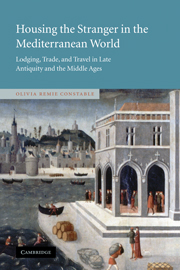 Housing the Stranger in the Mediterranean World
Housing the Stranger in the Mediterranean World Published online by Cambridge University Press: 27 August 2009
Over the centuries – from the pandocheion in the Gospel of Luke to the fondacos in the Decameron of Boccaccio – one word evolved into many and one institution spawned an extended family of related institutions. As in any family, these institutions grew apart from each other over time and distance, and far-flung branches came to look quite different from one another. In most cases, however, their common ties remained recognizable, and were even acknowledged by the medieval merchants and travelers who encountered these hostels, colonies, and warehouses around the Mediterranean. Funduqs and fondacos thrived in all the major Mediterranean cities, in both Christian and Muslim regions (with the exception of Byzantium), throughout the medieval period. This institutional group always retained a fundamentally Mediterranean character. Despite its broad diffusion across political, religious, and linguistic frontiers, it only established firm roots in areas close to this sea.
A shared culture of trade and travel in the medieval Mediterranean world supported the ubiquitous distribution of these institutions. In their turn, pandocheions, funduqs, and fondacos facilitated the travel and business activities of merchants, pilgrims, and other wayfarers. Pandocheions took in guests from all walks of life, and were thus shared spaces familiar to pagans, Jews, and Christians throughout the eastern Mediterranean in late antiquity. After the seventh century, the presence of funduqs and khāns in cities throughout the Dār al-Islām came to define the very identity of these urban centers as “cities,” and these hostels promoted the development of an extensive commercial network linking all regions of the medieval Muslim world.
To save this book to your Kindle, first ensure no-reply@cambridge.org is added to your Approved Personal Document E-mail List under your Personal Document Settings on the Manage Your Content and Devices page of your Amazon account. Then enter the ‘name’ part of your Kindle email address below. Find out more about saving to your Kindle.
Note you can select to save to either the @free.kindle.com or @kindle.com variations. ‘@free.kindle.com’ emails are free but can only be saved to your device when it is connected to wi-fi. ‘@kindle.com’ emails can be delivered even when you are not connected to wi-fi, but note that service fees apply.
Find out more about the Kindle Personal Document Service.
To save content items to your account, please confirm that you agree to abide by our usage policies. If this is the first time you use this feature, you will be asked to authorise Cambridge Core to connect with your account. Find out more about saving content to Dropbox.
To save content items to your account, please confirm that you agree to abide by our usage policies. If this is the first time you use this feature, you will be asked to authorise Cambridge Core to connect with your account. Find out more about saving content to Google Drive.